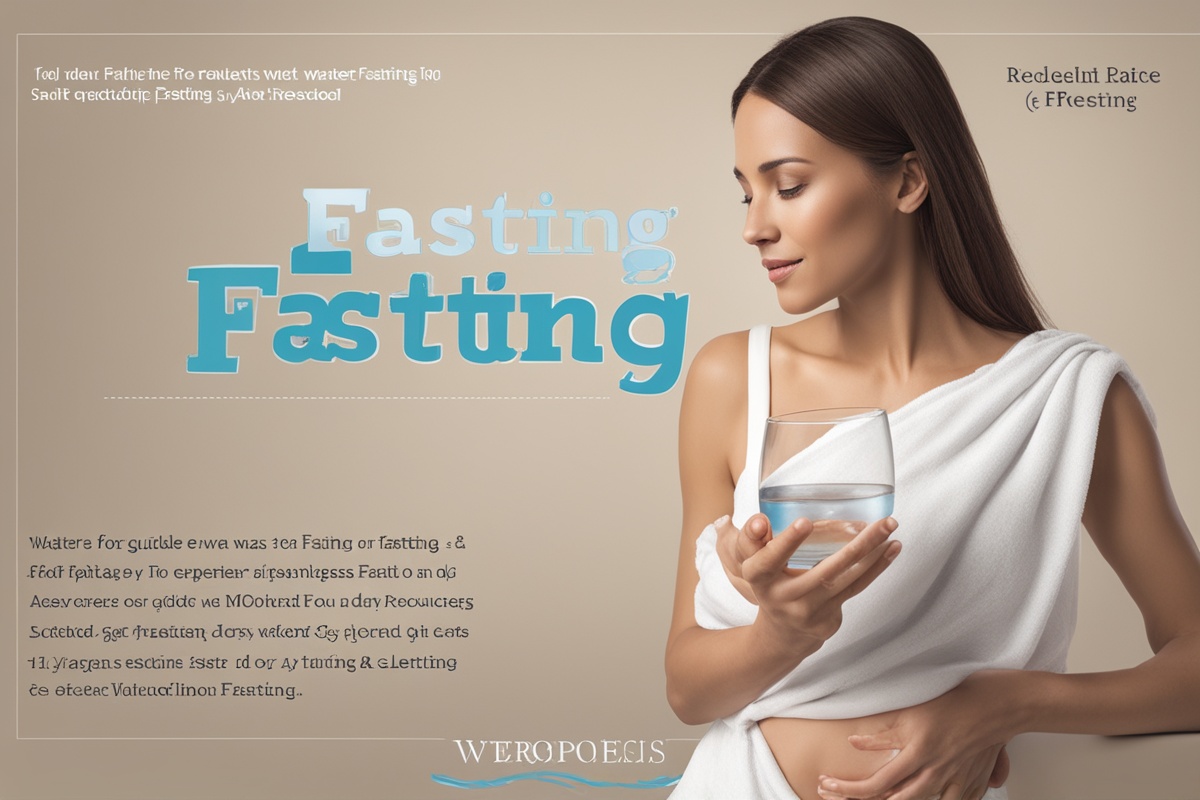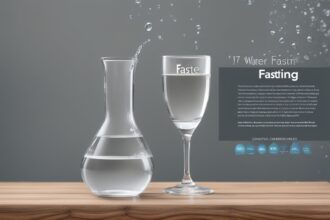Have you ever considered hitting the reset button on your health? Water fasting, a practice as old as humanity itself, might just be the way to do it. Simply put, a water fast involves abstaining from all food and drink except water for a set period. While it may sound daunting, the water fast benefits are gaining attention from health enthusiasts and researchers alike. From weight loss to cellular repair, this ancient practice offers a range of potential perks for both body and mind. In this comprehensive guide, we’ll dive deep into what water fasting is, explore its scientifically backed advantages, and share practical tips to help you decide if it’s right for you. Let’s uncover why water fasting could be a game-changer for your wellness journey.
What Is Water Fasting and How Does It Work?
Water fasting is a type of fasting where you consume only water—no food, no juices, no supplements—for a specific duration, typically ranging from 24 hours to several days. Unlike intermittent fasting, which includes eating windows, or juice fasting, which allows liquid calories, a water fast is a complete caloric restriction. The goal? To give your digestive system a break and trigger a cascade of physiological processes that promote healing and renewal.
During a water fast, your body shifts from using glucose (from food) as its primary energy source to burning stored fat through a process called ketosis. After about 12–16 hours without food, glycogen stores in the liver deplete, and your body starts tapping into fat reserves for fuel (Mattson et al., 2017). This metabolic switch is at the heart of many water fasting health benefits, as it not only aids weight loss but also initiates deeper cellular cleanup processes like autophagy, which we’ll explore later. Historically, water fasting has been used in religious and spiritual contexts, but today, it’s often embraced for its potential therapeutic effects.
Key Water Fast Benefits Backed by Science
The buzz around water fast benefits isn’t just anecdotal—there’s growing scientific interest in how this practice impacts health. While long-term studies are still emerging, early research and clinical observations point to some compelling advantages. Here are the standout benefits of water fasting that might inspire you to give it a try.
- Weight Loss and Fat Burning: Since a water fast eliminates calorie intake, your body burns stored fat for energy, often leading to rapid weight loss. Studies suggest that fasting can enhance fat oxidation and improve metabolic efficiency (Anton et al., 2018).
- Improved Insulin Sensitivity: Water fasting may lower blood sugar levels and boost insulin sensitivity, which is crucial for preventing or managing type 2 diabetes (Barnard et al., 2019).
- Cellular Repair via Autophagy: During a prolonged fast, your body activates autophagy, a process where damaged cells are broken down and recycled. This “cellular housekeeping” is linked to anti-aging and disease prevention (Levine & Kroemer, 2019).
- Reduced Inflammation: Fasting has been shown to decrease markers of inflammation in the body, potentially lowering the risk of chronic conditions like heart disease (Faris et al., 2012).
Mental and Emotional Benefits of Water Fasting
Beyond the physical, many people report profound mental and emotional shifts during a water fast. While hunger can be a challenge initially, once your body adjusts, you might experience heightened clarity and focus. This could be due to the production of ketones, which are byproducts of fat breakdown and serve as an efficient fuel for the brain (Mattson et al., 2017). Personally, I’ve heard from friends who’ve described a sense of calm and even euphoria after the first couple of days of fasting—almost like a mental detox.
Water fasting can also foster mindfulness. Without the distraction of meal planning or snacking, you’re forced to tune into your body’s signals and reflect on your relationship with food. For some, this practice offers a chance to break unhealthy eating habits and build a stronger sense of self-discipline. While more research is needed on the psychological benefits of water fasting, the anecdotal evidence is hard to ignore.
Potential Risks and How to Water Fast Safely
While the water fast benefits are enticing, this practice isn’t for everyone. Fasting can be physically and mentally taxing, especially if done improperly or for too long. Common side effects include fatigue, dizziness, headaches, and irritability, particularly in the first 24–48 hours as your body adjusts. More serious risks, like electrolyte imbalances or dehydration, can occur during extended fasts, especially without medical supervision (Johnstone, 2015).
If you’re new to fasting, start slow. A 24-hour water fast once a week can be a gentle introduction before attempting longer durations like 3 or 5 days. Always consult a healthcare provider, especially if you have pre-existing conditions like diabetes, heart disease, or eating disorders. Pregnant or breastfeeding individuals and those under 18 should avoid water fasting altogether. The key is to listen to your body—if something feels off, stop and seek guidance.
Practical Tips for a Successful Water Fast
Ready to explore the advantages of water fasting? Preparation and mindset are everything. I’ve compiled some actionable tips to help you navigate your first water fast with confidence. These strategies can minimize discomfort and maximize the potential rewards.
- Prepare Your Body: A few days before starting, reduce processed foods, caffeine, and sugar to ease the transition. Opt for light, nutrient-dense meals to stabilize blood sugar.
- Stay Hydrated: Drink plenty of water—aim for 2–3 liters daily, depending on your activity level and climate. Add a pinch of Himalayan salt if you feel lightheaded to replenish electrolytes.
- Rest and Relax: Avoid strenuous exercise during a water fast. Focus on light activities like walking or stretching to conserve energy.
- Break the Fast Gently: When ending your fast, start with small portions of easily digestible foods like broth, fruits, or steamed vegetables to avoid digestive upset.
- Track Your Progress: Keep a journal to note how you feel physically and mentally. This can help you identify patterns and adjust future fasts accordingly.
How Long Should You Water Fast?
One of the most common questions about water fasting is, “How long is safe or effective?” The answer depends on your goals, experience level, and health status. Short-term fasts of 24–72 hours are generally considered safe for most healthy adults and can still yield noticeable water fasting health benefits like improved digestion and mental clarity. Longer fasts (5–7 days or more) may amplify benefits like autophagy and weight loss but come with higher risks and should only be done under medical supervision (Wilhelmi de Toledo et al., 2019).
Remember, fasting isn’t a one-size-fits-all solution. A beginner might start with a single day, while someone experienced with water fasting advantages might comfortably extend to a week. Always prioritize safety over duration—pushing your limits isn’t worth the potential harm. If you’re unsure, work with a nutritionist or doctor to create a personalized fasting plan.
In conclusion, water fasting offers a fascinating array of potential benefits, from physical rejuvenation to mental clarity. The water fast benefits—like weight loss, improved insulin sensitivity, and cellular repair—make it a powerful tool for those seeking a natural health boost. However, it’s not a magic bullet, and it requires careful planning and awareness of your body’s needs. By starting small, staying hydrated, and seeking professional advice when needed, you can safely explore the benefits of water fasting and see if it aligns with your wellness goals. Have you ever tried a water fast, or are you curious to start? Share your thoughts and experiences—I’d love to hear how this practice has impacted your journey!
References
- Anton, S. D., Moehl, K., Donahoo, W. T., Marosi, K., Lee, S. A., Mainous, A. G., … & Mattson, M. P. (2018). Flipping the metabolic switch: Understanding and applying the health benefits of fasting. Obesity, 26(2), 254-268.
- Barnard, N. D., Levin, S. M., & Yokoyama, Y. (2019). A systematic review and meta-analysis of changes in body weight in clinical trials of vegetarian diets. Journal of the Academy of Nutrition and Dietetics, 119(6), 954-966.
- Faris, M. A., Kacimi, S., Al-Kurd, R. A., Fararjeh, M. A., Bustanji, Y. K., Mohammad, M. K., & Salem, M. L. (2012). Intermittent fasting during Ramadan attenuates proinflammatory cytokines and immune cells in healthy subjects. Nutrition Research, 32(12), 947-955.
- Johnstone, A. (2015). Fasting for weight loss: An effective strategy or latest dieting trend? International Journal of Obesity, 39(5), 727-733.
- Levine, B., & Kroemer, G. (2019). Biological functions of autophagy genes: A disease perspective. Cell, 176(1-2), 11-42.
- Wilhelmi de Toledo, F., Buchinger, A., Burggrabe, H., Hölz, G., Kuhn, C., Lischka, E., … & Michalsen, A. (2019). Fasting therapy for treating and preventing disease—current state of evidence. Forschende Komplementärmedizin, 20(6), 444-453.






